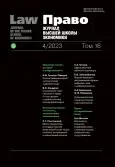Procurator Office in the Russian State Mechanism: Theoretical, Historical and Normative Aspects
- Autores: Rokityanskiy S.1
-
Afiliações:
- University of the Procurator Office of the Russian Federation
- Edição: Volume 16, Nº 4 (2023)
- Páginas: 80-102
- Seção: Russian Law: Condition, Perspectives, Commentaries
- URL: https://journal-vniispk.ru/2072-8166/article/view/318267
- DOI: https://doi.org/10.17323/2072-8166.2023.4.81.102
- ID: 318267
Citar
Texto integral
Resumo
Although the Russian Procurator Office supervision has the centuries-old history, there is still no consensus in doctrine on its status and place in the state mechanism. The legal enactments of the Russian Empire and the USSR as well as current legislation in force do not certainly refer the Procurator Office to either agencies of state power or to other state agencies, and this fact is estimated by various scholars as a cue to doctrinal discussion. A lot of inconsistent arguments have been expressed about the Procurator Office’s disposition within a presidential, legislative, executive, judicial and even ‘supervisory-controlling’ branches. Such a diversity of opinions cannot be justified by ideological pluralism and is unacceptable from the perspective of legal studies, since the correct classification of a legal phenomenon can be only gained by means of due definition of its specific and stable characteristics Procurator Office, evidently, possesses with respect to its centuries-old history. The accurate consideration of thisissue has not only theoretical, but also practical significance. Firstly, if the Procurator Office was declared to be agency of state power, it would be at once inserted in the relations within separation of powers principle. Secondly, it affects the constitutional stature of the institute having impact on the general patterns and the framework of the further development of Russian supervisory institution. The author has addressed the issue in respect of three dimensions: basic provisions of the legal theory, historical transformations of the Procurator Office within system of the Russian State and the normative (legislative) trends. As a result, the position has been elaborated that the longestablished legislative approach may be reckoned not as the silence of the legislator, but as a deliberate decision on the status of the Procurator Office as a supervisory institution sui generis. Addressing this issue, three factors have been identified and taken into account:derivative legal status of the Procurator Office (determination of its powers at the discretion of the legislator);historically determined systemic relationship between Procurator Office and the institution of supreme power; supervision over the legality and validity of the authority exercised by other state bodies as a distinctive feature of the Procurator Office in the state mechanism of Russia.
Sobre autores
Sergey Rokityanskiy
University of the Procurator Office of the Russian Federation
Email: noreply@hse.ru
Postgraduate Student
Bibliografia
- Lomovskiy V. (2001) What branch does Procurator Office belong to. Rossiiskaia yustitsiia=Russian justice, no. 9 (in Russ.) Available at: URL:https://base.garant.ru/3917029/(дата обращения: 01.09.2023)
- Anan'eva A. A., Bakulina L.T. et al. (2022) Legal science in the modern world: Russia and Bulgaria. Moscow: Prospekt, 584 p. (in Russ.)
- Avakyan S.A. (2015) Constitutional lexicon: terminology and vocabulary. Moscow: Yustitsinform, 640 p. (in Russ.)
- Bessarabov, V. (1999) Procurator office place in state mechanism of Russia. Zakonnost'=Legality, no. 10, pp. 40-45 (in Russ.)
- Chirkin V.E. (2003) Constitutional law of Russia. Moscow: Norma, 474 p. (in Russ.)
- Chuglazov G. (2003) Procurator Office within the system of state power bodies. Zakonnost'=Legality, no. 2, pp. 30-32 (in Russ.)
- Dolezhan V.V. (1991) Issues of Procurator Office competence. Doctor of Juridical Sciences Summary. Moscow, 50 p. (in Russ.)
- Glazunova N.I. (2007) State and municipal management. Textbook. Moscow: Prospekt, 560 p. (in Russ.)
- Klishas A.A. et al. (2019) Theory of state and law. Moscow: Statut, 512 p. (in Russ.)
- Kokoshkin F. F. (1912) Lectures on general state law. Moscow: Kushnerev, 306 p. (in Russ.)
- Kokotov A.N. (2007) Constitutional law of Russia: course of lectures. Moscow: Prospekt, 296 p. (in Russ.)
- Korkunov N.M. (1909) Lectures on general legal theory. Moscow: Belokopytov, 354 p. (in Russ.)
- Kulagin P. (2001) Procuratorate should become the organ of presidential power. Zakonnost'=Legality, no. 1, pp. 29-30 (in Russ.)
- Lesiv B. (2019) Respect for the court as a constitutional value: shaping the doctrine. Suďya=Judge, no. 9, pp. 32-40 (in Russ.)
- Lesiv B. (2020) Reality and potential of behavioral constitutional review: a comparative study. Sravnitel'noe konstitucionnoe obozrenie=Comparative Constitutional Review, no. 6, pp. 141-170 (in Russ.) DOI:https://doi.org/10.21128/1812-7126-2020-6-141-170
- Matuzov N.I., Mal'ko A.V. (2013) Theory of state and law. Textbook. Moscow: Delo, 528 p. (in Russ.)
- Petrovskiy S.A. (1875) Senate during the reign of Peter the Great. Historical and legal study. Moscow: University, 375 p. (in Russ.)
Arquivos suplementares








